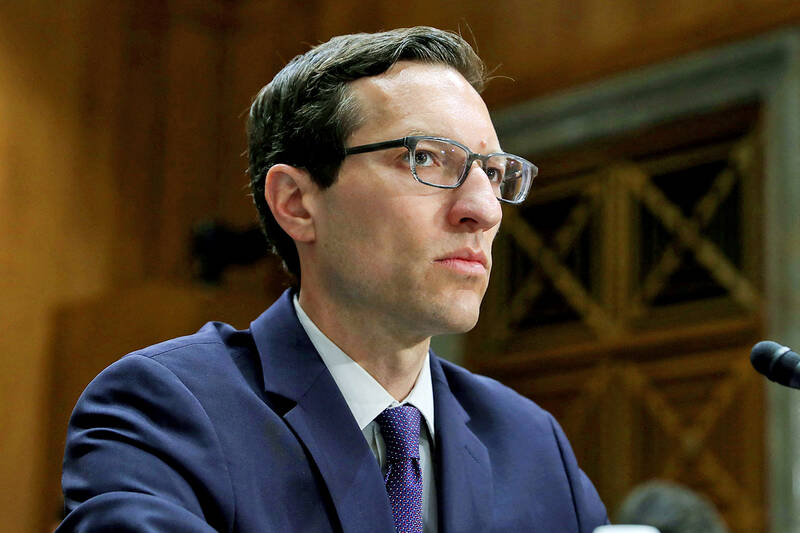Open communication channels between the US and China are important in maintaining peace and stability across the Taiwan Strait, US Assistant Secretary of Defense for Indo-Pacific Affairs Ely Ratner said on Thursday.
Ratner made the remark at an event held by the Washington-based Center for Strategic and International Studies to discuss the US’ role in Indo-Pacific security.
The event was held prior to US Secretary of Defense Lloyd Austin’s planned trip to Japan, Singapore, India and France next week, which includes attending the 20th Shangri-La Dialogue in Singapore, the US Department of Defense said in a press release on Thursday.

Photo: Reuters
Deterring China does not only involve the defense capabilities of the US and its allies, but also the types of interaction between the US and China, where communication is “an important ingredient to maintain peace,” Ratner said.
Austin has repeatedly underlined the importance of open lines of communication with Beijing to prevent misperception and miscalculation during peacetime or crisis, he said.
US officials, such as Austin, US Joint Chiefs of Staff Chairman General Mark Milley and US Indo-Pacific Commander Admiral John Aquilino, have proposed telephone calls, meetings and dialogue with Beijing, but has “repeatedly have had those requests rejected or not answered,” he said.
The US and the department “have had an outstretched hand on this question of military-to-military engagement and we have yet to have had a consistently willing partner,” he said.
For example, several weeks ago, Austin and the department initiated requests to meet with Chinese Minister of National Defense Li Shangfu (李尚福) at the Shangri-La Dialogue, which “has not been answered one way or another,” he said.
China said that Li has been sanctioned under the Countering America’s Adversaries Through Sanctions Act, but the sanction has “no legal or technical bearing on” the meeting, Ratner said.
The US often experiences difficulties in leveraging the communication channels with China, which is “often shifting from one reason to another as to why at any particular moment it is inopportune or inconvenient,” he said.
Regarding US commitment to Taiwan, Ratner said that Washington has “a clear objective to maintain the ‘status quo’ in the Taiwan Strait” as it believes that to be in the best interests of the entire region.
Under the Taiwan Relations Act, the US is committed to providing Taiwan with the defensive arms it needs to defend itself and maintaining its own capacity to resist coercive efforts, he said.
“Conflict across the Strait is either inevitable or imminent,” as the US is confident that “deterrence is real, and deterrence is strong,” he said.
“Our job is to keep it that way tomorrow. Next week, next year and then of the future,” he added.

An essay competition jointly organized by a local writing society and a publisher affiliated with the Chinese Communist Party (CCP) might have contravened the Act Governing Relations Between the People of the Taiwan Area and the Mainland Area (臺灣地區與大陸地區人民關係條例), the Mainland Affairs Council (MAC) said on Thursday. “In this case, the partner organization is clearly an agency under the CCP’s Fujian Provincial Committee,” MAC Deputy Minister and spokesperson Liang Wen-chieh (梁文傑) said at a news briefing in Taipei. “It also involves bringing Taiwanese students to China with all-expenses-paid arrangements to attend award ceremonies and camps,” Liang said. Those two “characteristics” are typically sufficient

A magnitude 5.9 earthquake that struck about 33km off the coast of Hualien City was the "main shock" in a series of quakes in the area, with aftershocks expected over the next three days, the Central Weather Administration (CWA) said yesterday. Prior to the magnitude 5.9 quake shaking most of Taiwan at 6:53pm yesterday, six other earthquakes stronger than a magnitude of 4, starting with a magnitude 5.5 quake at 6:09pm, occurred in the area. CWA Seismological Center Director Wu Chien-fu (吳健富) confirmed that the quakes were all part of the same series and that the magnitude 5.5 temblor was

The brilliant blue waters, thick foliage and bucolic atmosphere on this seemingly idyllic archipelago deep in the Pacific Ocean belie the key role it now plays in a titanic geopolitical struggle. Palau is again on the front line as China, and the US and its allies prepare their forces in an intensifying contest for control over the Asia-Pacific region. The democratic nation of just 17,000 people hosts US-controlled airstrips and soon-to-be-completed radar installations that the US military describes as “critical” to monitoring vast swathes of water and airspace. It is also a key piece of the second island chain, a string of

The Central Weather Administration has issued a heat alert for southeastern Taiwan, warning of temperatures as high as 36°C today, while alerting some coastal areas of strong winds later in the day. Kaohsiung’s Neimen District (內門) and Pingtung County’s Neipu Township (內埔) are under an orange heat alert, which warns of temperatures as high as 36°C for three consecutive days, the CWA said, citing southwest winds. The heat would also extend to Tainan’s Nansi (楠西) and Yujing (玉井) districts, as well as Pingtung’s Gaoshu (高樹), Yanpu (鹽埔) and Majia (瑪家) townships, it said, forecasting highs of up to 36°C in those areas